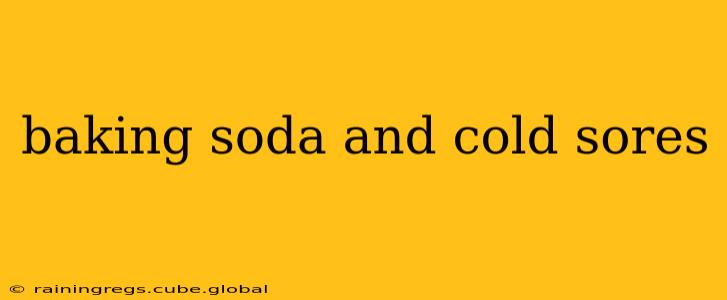Cold sores, those pesky blisters caused by the herpes simplex virus (HSV-1), can be incredibly frustrating. While there's no cure, many home remedies promise relief. One popular suggestion is baking soda. But does it actually work for cold sores, and if so, how? Let's delve into the science and explore what the research says.
Does Baking Soda Help with Cold Sores?
Baking soda, or sodium bicarbonate, is a mild alkali. Its slightly alkaline nature is thought by some to help balance the pH of the skin, potentially hindering the virus's growth. However, there's limited scientific evidence directly supporting baking soda's effectiveness in treating cold sores. Most claims are anecdotal, based on personal experiences rather than rigorous clinical trials.
While baking soda might provide temporary relief from the discomfort of a cold sore by drying out the blister and reducing inflammation, it doesn't address the underlying viral infection. It's crucial to understand this distinction. Baking soda can offer symptomatic relief, but it won't cure the cold sore or prevent future outbreaks.
How to Use Baking Soda for Cold Sores (If You Choose To)
If you decide to try baking soda, proceed cautiously. Because it's an abrasive substance, applying it improperly can irritate the already sensitive skin around your cold sore.
Here's how to use baking soda for cold sores, should you choose to try it:
- Mix a paste: Combine a small amount of baking soda with just enough water to create a smooth paste.
- Apply sparingly: Gently apply a thin layer of the paste to the cold sore using a clean finger or cotton swab. Avoid rubbing vigorously.
- Let it dry: Allow the paste to dry completely.
- Rinse: Gently rinse the area with lukewarm water.
- Repeat: Repeat this process several times a day, but avoid overdoing it, as this can lead to further irritation.
What Are the Side Effects of Using Baking Soda on Cold Sores?
While generally considered safe for topical use, baking soda can cause irritation for some people. Signs of irritation include redness, burning, or increased pain. If you experience any adverse reactions, discontinue use immediately and consult a doctor. People with sensitive skin should exercise extra caution.
Can Baking Soda Prevent Cold Sores?
No, baking soda cannot prevent cold sores. Prevention focuses on managing triggers like stress, sun exposure, and weakened immunity. Good hygiene practices, such as avoiding sharing utensils or lip balms, can also help reduce the spread of the virus.
What are other home remedies for cold sores?
Many people find relief from cold sore symptoms using various home remedies. These include applying ice to reduce swelling, using over-the-counter pain relievers, and applying a lip balm with a moisturizing ingredient such as petroleum jelly. However, these too only offer symptomatic relief.
What is the best treatment for cold sores?
The most effective treatment for cold sores is antiviral medication, such as acyclovir, valacyclovir, or famciclovir. These medications can shorten the duration and severity of outbreaks. Your doctor can determine the best course of treatment for you.
When should I see a doctor about a cold sore?
While most cold sores heal on their own within a week or two, you should consult a doctor if:
- Your cold sores are unusually severe or frequent.
- You experience complications such as a bacterial infection.
- Your cold sores don't heal within a reasonable timeframe.
- You have a weakened immune system.
Remember, while baking soda might offer temporary relief for some, it's not a cure for cold sores. For effective treatment and prevention strategies, consult a healthcare professional. They can provide personalized advice and recommend appropriate medical interventions.
